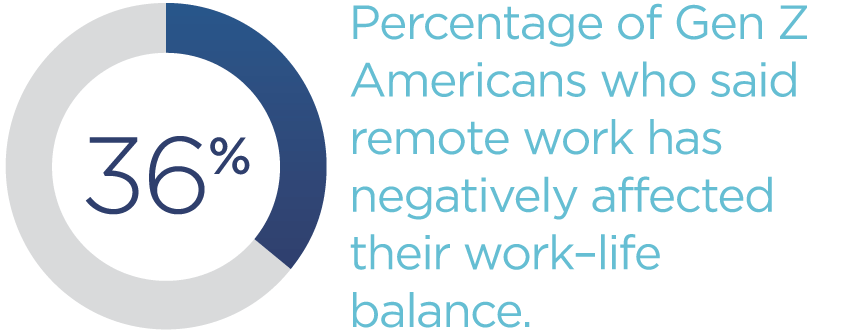Remote Work Changes Generational Expectations for Leaders
How have different generations been affected by a rapidly changing workforce reality, including a broad shift to remote workplaces? The Center of Generational Kinetics, LLC (CGK), sought to find out with its 2020 study, Solving the Remote Work Challenge Across Generations, which polled 1,000 workers of varying age groups (Gen Z, millennials, Gen X, and baby boomers) across the United States about their attitudes toward work, remote work, and what they are looking for from their company and leadership during challenging times.
The survey found that over a 30-day period in mid-2020, more than a third of Americans experienced decreased work hours and were less busy at work.
Out of the four generations examined, Gen Z employees experienced the most workplace challenges: 45 percent saw decreased work hours, 37 percent were unable to work or get paid, and 26 percent had filed for unemployment, according to the CGK report. All in all, 25 percent of Gen Z Americans surveyed said they will be worse off when the pandemic is over.
Older generations were facing different challenges: half of millennials and Gen X employees were working completely remotely or from home, and 19 percent of baby boomers said they had to take unpaid time off in the previous 30 days.

Nearly 50 percent of all Americans were working completely remotely. When asked how remote work had affected their jobs, 46 percent said they trusted their teams more, 46 percent said they were more productive, and 44 percent said team communication and collaboration had improved. Nearly half of survey respondents said they would like to continue working remotely part of the time post-pandemic; 35 percent wanted to work remotely full time.
While most millennials and Gen Z employees agreed that remote work fosters better communication and trust in the workplace, Gen Z found remote work more challenging overall. More than any other generation, 36 percent of Gen Z workers said remote work had negatively affected their work–life balance—32 percent said remote work had been an imposition on their lives, and 34 percent said their employer needed to provide them with better remote work tools.
Remote work has also changed management, the CGK study found. Over a third of Americans said the most important quality in a manager is now to be honest and communicate clearly during challenging times. Along generational lines, Gen Z wants well-informed managers who are empathetic to their employees’ challenges, millennials want well-prepared managers who can quickly solve problems, and Gen X and baby boomers want managers to be honest and candid with them.
Americans across age groups were largely split over whether they could trust their managers and whether their employer had acted with integrity during the pandemic. Millennials in particular were more trusting; 60 percent said they felt their employer has acted with integrity.
